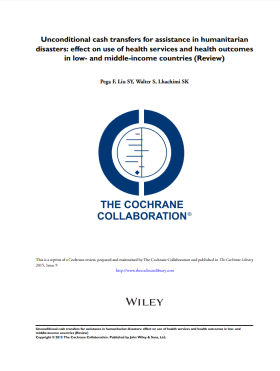Unconditional Cash Transfers for Assistance in Humanitarian Disasters: Effect on use of health services and health outcomes in low- and middle-income countries
Unconditional cash transfers (UCTs) for humanitarian assistance during disasters may improve health in low- and middle-income countries (LMICs) by giving recipients additional income.
This study sought to assess the effect of UCTs on health services use, health outcomes, social determinants of health, health care expenditure and local markets and infrastructure in LMICs. It also assessed the effects of UCTs paid in-hand compared with grants of other goods (e.g., food) and types of cash transfers.
Three studies on a total of 13,885 participants (9640 children and 4245 adults) and 1200 households in Nicaragua and Niger are covered. They examined five programmes by governmental, non-governmental or research organisations that gave recipients cash handouts worth USD 145 to USD 250 (or more, depending on household characteristics) as part of a disaster response (in these cases,to droughts).



